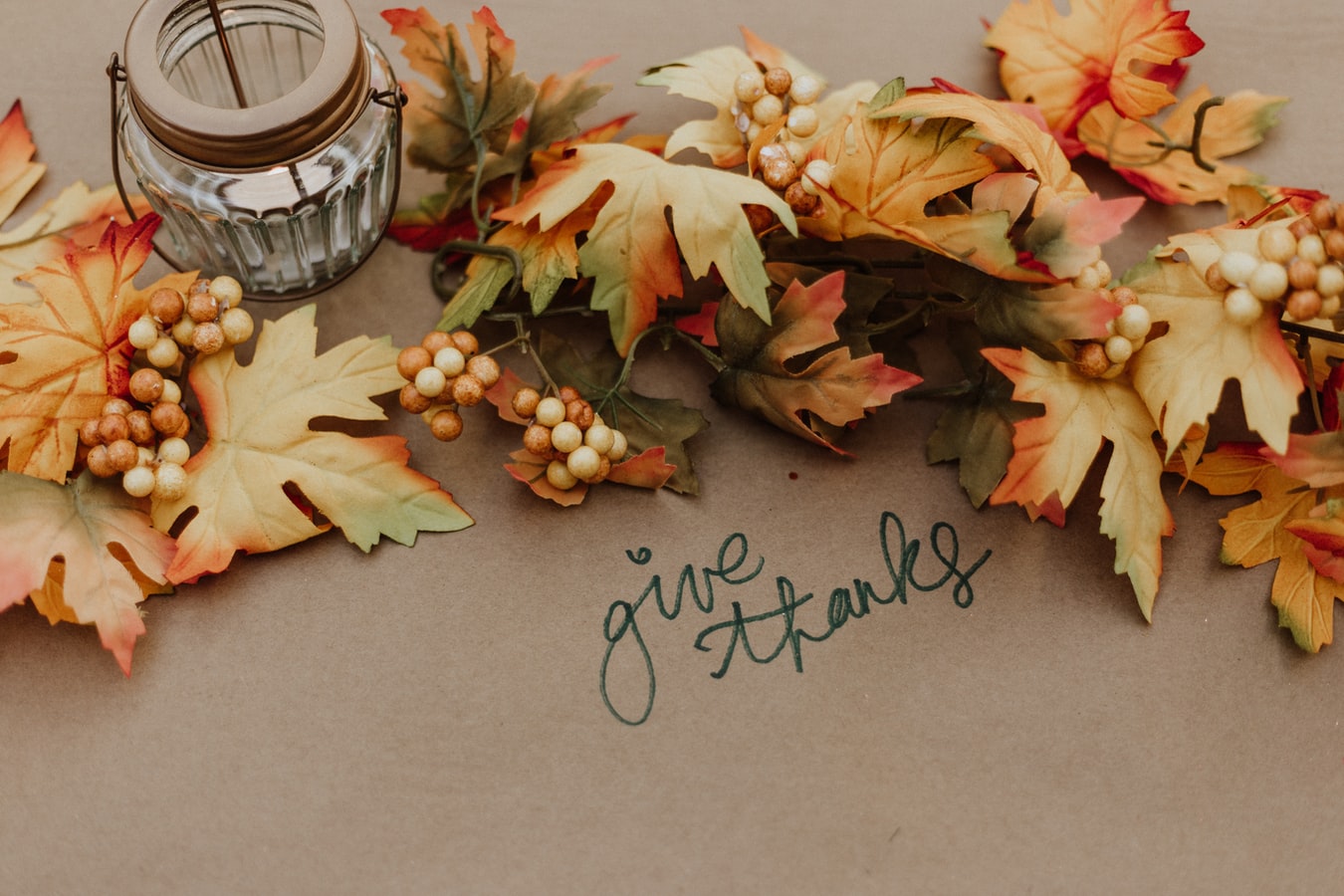As I begin preparing the Thanksgiving meal a few dishes at a time—making cranberry sauce and pie dough on Monday; assembling pies, baking cornbread for stuffing, and brining the turkey on Tuesday—the importance of giving thanks in all things is at the forefront of my mind.
I’m thinking about thankfulness because my supply is running low.

This holiday season the sadness of dashed expectations is present daily, humming in the background. On Thursday my family’s celebration, like those of other careful Americans, will be smaller than usual. Much smaller. As infections spread and intensive-care units fill, we retreat to our homes, missing our connections with loved ones near and far. Out-of-state children will not be visiting; nearby family members must remain in their own homes to avoid the risk of spreading the coronavirus.

My younger daughter’s boyfriend will join us at our table before we head out to deliver turkey and fixings to front porches, waving at loved ones across a socially distant chasm.
On Sunday, if there is still room in our socially distanced pews, we will join a group of fifty masked parishioners to attend the Divine Liturgy. But even this disheartening form of fellowship may vanish again, if “safer at home” guidelines change to “stay at home” restrictions.
As my world contracts, melancholy threatens to overwhelm my desire for a heart of thanksgiving. Elder Macarius of Optina (+1860) understood this weakness:
The inexpressible and unaccountable melancholy that oppresses you and prevents you from enjoying anything may be a test, intended to prove the firmness of your decision and the purity of your love of God. — Russian Letters of Spiritual Direction, p.43
I suspect that the elder is correct. My decision to seek God more purposefully during the early days of the pandemic has lost its focus. My love for Him is impure and divided at best. But I am tired of the test. Like so many others, I am experiencing Quarantine Fatigue.
Paper Towels, Toilet Paper, and Patience

Grocery stores are rationing paper towels and toilet paper again as consumers clear the shelves, preparing for another lockdown. At my house, as I work on Thanksgiving prep, I clear the shelves in my kitchen pantry, sifting flour and opening cans and lugging potatoes to the cutting board. In the simplicity of these mundane chores, I have time to think. I examine the small pantry of virtues in my own heart and discover, in addition to a low supply of thankfulness, my stores of patience are running low.
I just want all of this to be over.
Our lives are filled with waiting, with almost-but-not-yets. Nothing resolves. We must wait for a safer time to visit with the people we love. We must wait to worship freely again with our church families. We must wait to plan vacations. Family traditions are disappearing this year; perhaps we will reclaim them next year.
Frustrated and weary, I continue to wait. And I see that my impatience is linked to my mood and my sense of gratitude.
The Tattered State of Our Little Home Church
Recently I read some words of wisdom from St. Seraphim of Sarov (+1833), who managed to describe the current state of American society with great prescience—especially the raging dumpster fire that is social media:
Beware of the spirit of despondency, for it gives birth to every evil. A thousand temptations come from it: agitation, rage, blame, complaint against one’s fate, profligate thoughts, constant change of place. The soul then avoids people, believing them to be the cause of its trouble, and does not understand that the cause of the illness is within itself. — A Spiritual Biography, p.47
But St. Seraphim is not talking about anonymous people out there somewhere; he is describing the state of my own heart.
In the early weeks of this pandemic, patience and gratitude came more easily. I blogged about some of the unexpected gifts of stay-at-home orders—the realities forced upon us that are worth preserving after the quarantines lift. One of these is the practice of sheltering at home by choice rather than necessity:
More than one priest or Ancient Faith blogger has commented on the monastic feel of this year’s Great Lent. In a sense, those of us in the world are experiencing our homes as monastic cells—the places where we live, work, and pray. In this season, our homes are more than a pit stop on our way elsewhere, a place to bunk, somewhere to hang our hats. If our homes were not the center of our lives even a few months ago, they are now.

But we’ve all had eight months in our little monastic cells, and the view is getting old. We’re no longer novices learning a new way of life; we’re in the long season of struggle for our salvation. As this season has dragged on, my little home church has frayed a bit at the edges. Since the early days of participating in online Holy Week services, I’ve allowed the fatigue and melancholy to lead to disengagement. I can’t remember the last time I lit the charcoal in the censer at home. I’ve served frequently as an usher during church services, but once that box is checked, I don’t prioritize watching the liturgy online.
On some days I’ve prayed more. Other times, not so much. Spiritually, I feel a lot like comic Trey Kennedy in his video, “Day 1 in Quarantine vs. Day 50.”
I’m impatient. I’m frustrated. But if I am to grow in Christ, if I am to give thanks in everything (1 Thess. 5:18), I must learn to wait with hope, with confidence in God’s love, and, yes, with patience. Patience is a fruit of the Spirit (Gal. 5:22), and Jesus commended the church of Ephesus for this virtue: “and you have persevered and have patience, and have labored for My name’s sake and have not become weary” (Rev. 2:3).
Blessed Makrina of Portaria (+1995) understood the importance of patience:
Like an enormous ocean, like great rivers and valleys, may the Lord grant us so much patience. The grace of patience is the strongest grace, because patience is at the foundation of all virtues. We cannot perform a single virtue without patience.
Giving Thanks in All Seasons

Around our table on Thanksgiving Day, we will give thanks—four of us instead of ten or twelve. Until then, and afterwards, I will thank God for the waiting, the uncertainty, and the lack of resolution, trusting that He will use all of these things to mold and shape me into His image.
With God’s grace I can take a deep breath and respond in love, giving thanks for His many gifts in my life, including the gift of waiting and the opportunity to grow in patience.
I can do this. We can do this.
That which calls us forward is love: the love God has shown us, and the love the heart desires to return to Him. So accept your little cross out of love, and do not become disheartened when pains and struggles accompany the life to which we are called. — Bishop Irenei Steenberg, The Beginnings of a Life of Prayer, p.114